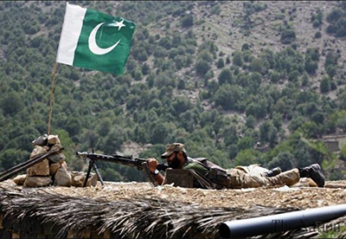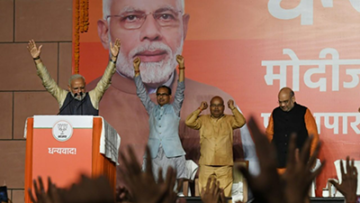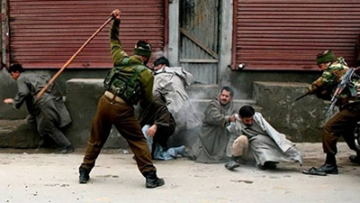In an unexpected move, the ceasefire along the Line of Control (LoC) between Pakistan and India has finally been restored. Ostensibly, it is a positive development. After all, who can argue against guns falling silent along the disputed Kashmir frontiers and providing respite to villagers living on both sides of this artificial divide.
But the hushed manner in which the agreement was made, raises more questions than providing answers about the future of Indo-Pak relations and, more specifically, the fate of Occupied Jammu & Kashmir.
It is pertinent to ask what prompted the Director-General Military Operations (DGMOs) of the two countries to come up with their surprise joint statement of February 25, 2021? Is this development in any way linked to the de-escalation between China and India on their disputed borders in the Ladakh region? Has the new US-administration under President Joe Biden played any behind-the-scenes role in pushing the two nuclear-armed South Asian rivals to step back and ease tensions? And to what end? How does it suit Pakistan’s objectives? How is it beneficial to Kashmir’s freedom struggle? These critical questions are triggering all sorts of speculation in the absence of any official details regarding this development.
But in the context of Pakistan and Kashmir, perhaps the bigger and crucial question remains: what next? Will this ceasefire be followed by a resumption of talks? What will be the ambit of these talks? Should Pakistan set any pre-conditions for them, including the demand that India first revoke its unilateral decision of August 5, 2019, which changed the status of Occupied Jammu & Kashmir and desist from changing the demographics of this Muslim-majority region?

After announcing the ceasefire, the Pakistani leadership has, once again, expressed a desire to re-engage with India, but made no mention that New Delhi first revert Occupied Kashmir to its pre-August 5, 2019 status to create a conducive atmosphere for the talks. This is an ominous sign.
If Islamabad continues on this trajectory, which appears to be the case, then any resumption of talks — sooner or later — under the changed status of Occupied Kashmir, will be a decisive win for India’s policy of brinkmanship and a blow to the Kashmiri struggle for the right of self-determination under the UN resolutions.
Indian Prime Minister Narendra Modi, in one stroke, has settled the Kashmir dispute in India’s favour and is now managing the fallout of his decision by using brute force. He changed the constitutional status of Occupied Kashmir and assimilated it into the union territory by transforming the region into the world’s largest prison. In doing this, New Delhi withdrew even the nominal constitutional guarantees given to Kashmiris, scrapped its bilateral agreements with Pakistan and violated the UN resolution.
In a nutshell, Modi broke the mould of conventional policies on Kashmir and dared to take a different route, anticipating the reaction on all three fronts — within Kashmir, Pakistan, and the world at large. And his assessment seems to be right. He managed to stifle the voice of Kashmiris and quelled their resistance with the use of military might. The world, barring a few statements here and there, largely turned a blind eye to Indian atrocities, human rights violations and media curbs in Kashmir. And Pakistan, too, did not go beyond conventional diplomacy — which has never worked in the past and failed to fight Kashmir’s case effectively post-August 5, 2019. Prime Minister Imran Khan’s passionate speech at the United Nations, his tweets and statements, and all the protests, rallies and expressions of solidarity with Kashmiris in Pakistan — all looked good on the domestic media, but failed to build any pressure on India.
Now, in less than two years since his controversial decision on Kashmir, Modi has agreed to the restoration of ceasefire with Pakistan at the LoC, which he himself has continuously violated, soon after assuming power in 2014. There is certainly a method to Modi’s madness.

Firstly, the restoration of ceasefire between Pakistani and Indian troops along the disputed Kashmir border is a positive symbolic gesture for New Delhi to show to the world. Secondly, whenever talks between the two estranged neighbours resume from now onwards, India will be doing it from a position of strength — by changing the matrix of the Kashmir dispute and tilting the rules of the game in its favour.
Any thaw in diplomatic relations, re-engagement and revival of normal trade or cultural ties in the near or distant future, with the changed status of Occupied Kashmir, would mean that India has finally had its way. If it agrees to resume talks with Pakistan now, it won’t be the proverbial ‘two steps forward and one step back’ policy; it would be akin to 10 steps forward and no step back.
India does not want to bring Kashmir on the table. Period. Consequently, any talks between the two countries following the scrapping of past agreements are meaningless. If the Pakistani leadership agrees to open dialogue with India against the backdrop of the changed ground realities, it would be the biggest betrayal of the country and the Kashmir cause. No amount of foreign pressure should force Pakistan to enter into talks with India until it revokes its August 5, 2019 measures.
If history is any guide, bilateralism between Pakistan and India has failed to resolve the main dispute of Kashmir or the secondary ones, including Siachen and Sir Creek. Even when there was a proper mechanism in place for bilateral engagement, the two sides failed to move an inch on any of these fronts. Holding talks for the sake of talks is meaningless, and, in the current scenario, will only harm Kashmir’s case.
A cold peace — which means downgraded diplomatic ties and a complete ban on trade relations — is the minimum that Pakistan can do under these circumstances.

The Modi government has already shown its aggressive designs by claiming Azad Kashmir and Gilgit Baltistan as their own territory. The Indians are stoking terrorism in Pakistan and working overtime to hurt Pakistan’s interests wherever they can. After the restoration of the ceasefire, the Indian Army was quick to announce that there would be no thinning of troops along the LoC and it repeated the allegation that Pakistan continues to sponsor terrorism in held-Kashmir, and threatened to give “a befitting response to any misadventure.”
Under these circumstances, any one-sided concession to India or holding meaningless talks will only strengthen the Indian position on Kashmir.
Unfortunately, Pakistan’s civil and military leadership had read Modi’s intentions incorrectly even in 2019, and they should not repeat the same mistake again. In the real world of international politics and diplomacy, counter-brinkmanship is the only response to brinkmanship.
Pakistani leaders, no matter how bogged down they are by the compulsions of domestic politics, the opposition-campaign, a weak economy and international pressure, must remember that there are national causes worth fighting and dying for — and Kashmir is one such cause.
Yes, peace should be the ultimate goal, but peace on Indian terms and at the cost of Kashmir will be unacceptable to the nation. Prime Minister Imran Khan and the Army Chief, General Qamar Javed Bajwa must ensure that history does not remember them as the leaders who took all the wrong turns when it came to Kashmir.




What a nonsense article by stupid journalists firstly this is a ceasefire on LOC where kashmiris are killed on both sides secondly general Bajwa has emphasised let’s talk but create an conducive environment now it’s obvious conducive environment entails restoring kashmirs special status finally India was already occupying kashmir since 70 years there is over 700, 000 soldiers on the ground paksitan is not china they cannot simply go and take kashmir we still have to use diplomatic measures and make ourselves economically stronger pak has made it clear that kashmir disput has to be resolved period also the UN EHRC are still on indias case that’s the strongest intl pressure applied since the start of this dispute